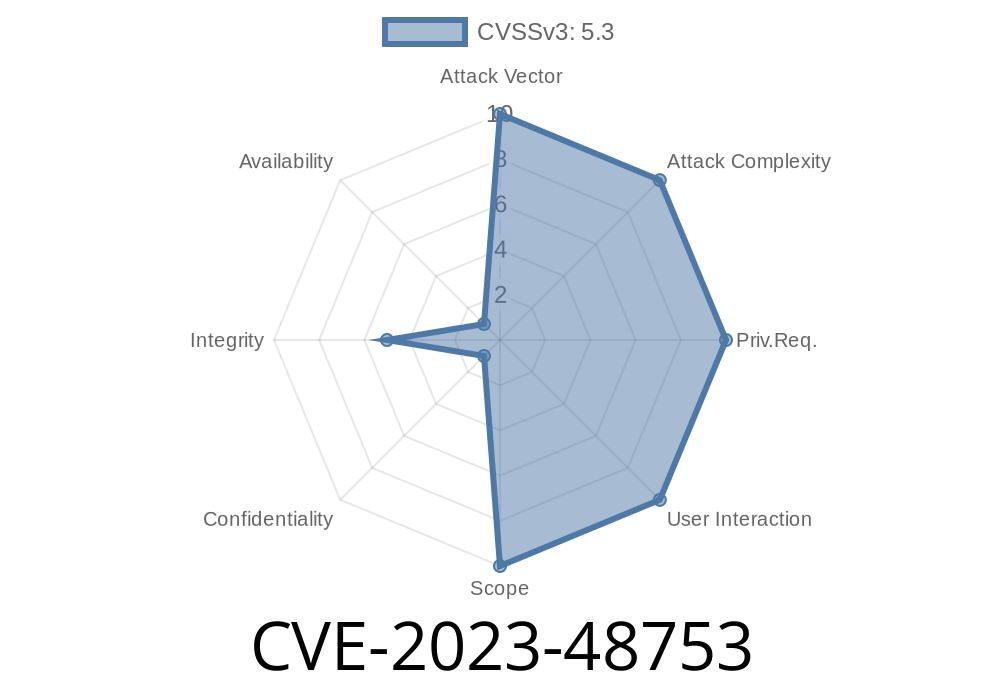Summary:
CVE-2023-48753 is a critical vulnerability in the “Restricted Site Access” WordPress plugin by 10up. This flaw, termed as “Authentication Bypass by Spoofing,” lets attackers get around the plugin's restrictions and view or interact with content meant to be off-limits. This vulnerability affects all plugin versions up to 7.4.1.
This article gives you a plain-English breakdown: what the bug is, how it works, which code is involved, proof-of-concept (PoC) exploit, and how to protect your website.
What is 10up Restricted Site Access?
The Restricted Site Access plugin (https://wordpress.org/plugins/restricted-site-access/) is popular among WordPress administrators for limiting who can visit a site. Often used for staging sites or intranets, it lets you block access for non-logged-in users or users outside an allowed IP range.
Discovered: 2023
- CWE: CWE-639: Authorization Bypass Through User-Controlled Key
- Original Report: WPScan advisory
How the Plugin Works
When someone visits your restricted WordPress site, the plugin matches their IP address or login status against access rules. If access isn’t allowed, it blocks the visitor or sends them elsewhere.
The Problem
Older versions of the plugin trust information in certain HTTP headers (X-Forwarded-For, etc.), which can be spoofed (faked) by attackers. This means an attacker can fake their IP address and trick the plugin into allowing them in — even if their real IP isn’t on the allowed list.
Here’s a typical way the plugin tries to check visitor IP
function get_user_ip() {
if ( ! empty( $_SERVER['HTTP_X_FORWARDED_FOR'] ) ) {
$ip = $_SERVER['HTTP_X_FORWARDED_FOR'];
} else {
$ip = $_SERVER['REMOTE_ADDR'];
}
return $ip;
}
// Later, it checks:
$allowed_ips = array('192.168.1.100', ...);
if ( in_array( get_user_ip(), $allowed_ips ) ) {
// Allow access
} else {
// Block user
}
Problem:
Clients can easily set the X-Forwarded-For header in their HTTP request, pretending to be from any IP.
Assume 192.168.1.100 is whitelisted on the WordPress site. An attacker runs
curl -H "X-Forwarded-For: 192.168.1.100" http://target-site.com/
Result:
Plugin trusts the header, gives full access, even if attacker’s real IP is not on the list.
Why Is This So Dangerous?
Any attacker with basic tools can abuse this from anywhere in the world. Sensitive content, admin areas, or in-development features can be seen by unauthorized users. Automated bots can crawl and interact with your “private” site.
1. Update Plugin
10up released version 7.4.2 with a fix. Update immediately from the official plugin page.
2. Disable IP-based Checks
If you must restrict by IP, ensure your web server (not PHP) invests the trust, or remove support for easily-spoofed headers unless you have a trustworthy proxy.
3. Server Hardening
If possible, discard incoming X-Forwarded-For headers unless set by a trusted proxy/load balancer.
For Apache
RequestHeader unset X-Forwarded-For env=!forwarded-proxy
For NGINX
proxy_set_header X-Forwarded-For $proxy_add_x_forwarded_for;
References
- WordPress Plugin Page – Restricted Site Access
- WPScan Vulnerability Entry
- NVD: CVE-2023-48753
- 10up plugin changelog
Conclusion
If you run the Restricted Site Access plugin (any version up to 7.4.1), your site might be exposed to anyone with simple technical knowledge. Never trust easily-forged HTTP headers from untrusted sources. Update your plugin, harden your server, and double-check your network trust assumptions today.
Stay safe, and keep your WordPress sites patched!
Need more info or a deep technical dive?
DM us or leave your questions below—happy to help clarify!
Timeline
Published on: 06/04/2024 11:15:50 UTC
Last modified on: 06/04/2024 16:57:41 UTC
